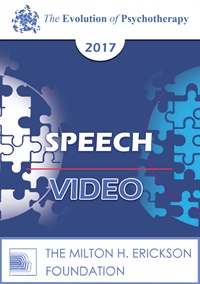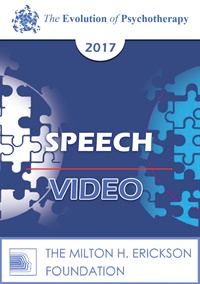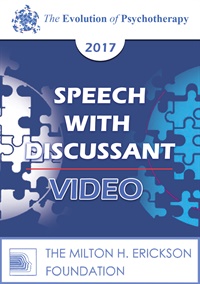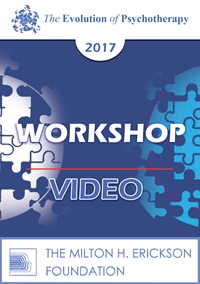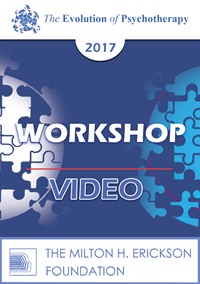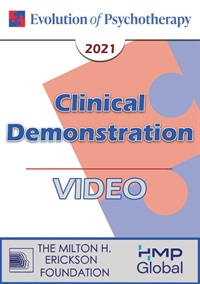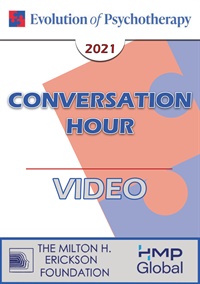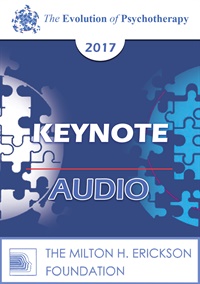
- Average Rating:
- Not yet rated
- Topic Areas:
- Keynotes | Couples Therapy | Family Therapy | Psychotherapy
- Categories:
- Evolution of Psychotherapy | Evolution of Psychotherapy 2017
- Faculty:
- Jeffrey Zeig, PhD | Sue Johnson, EdD | Salvador Minuchin, MD
- Duration:
- 54:31
- Format:
- Audio Only
- Original Program Date:
- Dec 13, 2017
- Short Description:
- In this presentation, Drs. Zeig and Johnson will present the essence of Sal Manuchin’s thinking and practice over the past 60 years. They will take us through his therapeutic process, and deconstruct the complexity of his artistry into simple techniques that can be used by therapists of different orientations.
- Price:
- $15.00 - Base Price
Credit available - Click Here for more information
- Average Rating:
- Not yet rated
- Topic Areas:
- Speeches | Attachment | Psychotherapy | Couples Therapy | Family Therapy
- Categories:
- Evolution of Psychotherapy | Evolution of Psychotherapy 2017 | Online Continuing Education
- Faculty:
- Sue Johnson, EdD
- Course Levels:
- Master Degree or Higher in Health-Related Field
- Duration:
- 41:22
- Format:
- Audio and Video
- Original Program Date:
- Dec 15, 2017
- Short Description:
- A coherent science on attachment now offers therapists a map for self and relational system that cogently outlines both dysfunction and health – and how to lead clients from one to the other. This presentation will outline the strengths of this integrating framework as a general and specific in-session guide for individual, couple and family therapy, focusing on the map it offers for affect regulation, cognitive restructuring and behavior change.
- Price:
- $0.00 - $29.00
Credit available - Click Here for more information
- Average Rating:
- Not yet rated
- Topic Areas:
- Speeches | Couples Therapy | Sex and Sexuality | Marriage | Relationships
- Categories:
- Evolution of Psychotherapy | Evolution of Psychotherapy 2017 | Online Continuing Education | Pioneers in Couples and Family Therapy
- Faculty:
- Michele Weiner-Davis, LCSW
- Course Levels:
- Master Degree or Higher in Health-Related Field
- Duration:
- 46:30
- Format:
- Audio and Video
- Original Program Date:
- Dec 16, 2017
- Short Description:
- Explore the emotional toll of mismatched sexual desire, a common yet often unspoken challenge in long-term relationships. Drawing from her book The Sex-Starved Marriage and over three decades of clinical experience, Weiner-Davis outlines a collaborative, solution-focused model to restore physical and emotional closeness. With warmth and clarity, she offers practical strategies to foster empathy, increase connection, and reignite desire.
- Price:
-
Sale is $29.00
price reduced from Base Price - $59.00
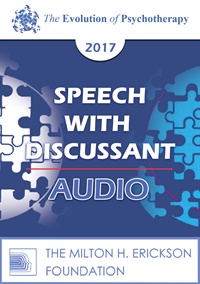
- Average Rating:
- Not yet rated
- Topic Areas:
- Speeches with Discussants | Couples Therapy | Relationships | Experiential Therapy | IMAGO
- Categories:
- Evolution of Psychotherapy | Evolution of Psychotherapy 2017 | Pioneers in Couples and Family Therapy
- Faculty:
- Harville Hendrix, PhD | Helen LaKelly Hunt, PhD | Harriet Lerner, PhD
- Duration:
- 1:33:34
- Format:
- Audio Only
- Original Program Date:
- Dec 16, 2017
- Short Description:
- This lecture features Imago Relationship Therapy, emphasizing a shift from individualism to a relational model grounded in connection. The Imago Dialog process uses structured conversations to promote safety, empathy, and zero negativity. Key elements include daily affirmations, relational competency, and the “space between” partners. The session also addresses trauma and the importance of making these tools accessible across cultures.
- Price:
- $15.00 - Base Price
Credit available - Click Here for more information
- Average Rating:
- Not yet rated
- Topic Areas:
- Speeches with Discussants | Couples Therapy | Family Therapy | Psychotherapy
- Categories:
- Evolution of Psychotherapy | Evolution of Psychotherapy 2017 | Online Continuing Education
- Faculty:
- John Gottman, PhD | Bill Bumberry, PhD | Jeffrey Zeig, PhD
- Course Levels:
- Master Degree or Higher in Health-Related Field
- Duration:
- 1:30:24
- Format:
- Audio and Video
- Original Program Date:
- Dec 16, 2017
- Short Description:
- It has been 50 years since General Systems Theory revolutionized psychotherapy. Yet it never became a real science, and the therapies it produced were either never evaluated or, when studied, produced only weak effects. We can now scientifically complete general systems theory and show that the new theory does result in highly effective couples and family therapy.
- Price:
-
Sale is $29.00
price reduced from Base Price - $59.00
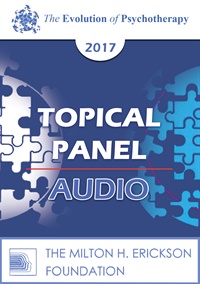
- Average Rating:
- Not yet rated
- Topic Areas:
- Topical Panels | Couples Therapy | Family Therapy | Strategic Therapy
- Categories:
- Evolution of Psychotherapy | Evolution of Psychotherapy 2017 | Pioneers in Couples and Family Therapy
- Faculty:
- Harville Hendrix, PhD | Helen LaKelly Hunt, PhD | Cloe Madanes, HDL, LIC | Esther Perel, MA, LMFT
- Duration:
- 1:00:42
- Format:
- Audio Only
- Original Program Date:
- Dec 15, 2017
- Short Description:
- This panel on family and couples therapy highlights the shift from individual-focused treatment to a relational model centered on emotional safety and connection. Key themes include the Imago dialog process, zero negativity, and the creation of positive shared memories. The discussion also addresses the changing landscape of marriage, integrating therapy into cultural contexts, and navigating the complexities of modern family life.
- Price:
- $15.00 - Base Price
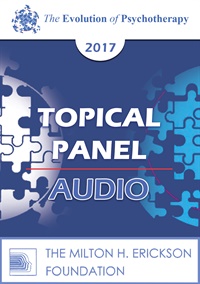
- Average Rating:
- Not yet rated
- Topic Areas:
- Topical Panels | Intimacy | Sex and Sexuality | Couples Therapy | Psychotherapy
- Categories:
- Evolution of Psychotherapy | Evolution of Psychotherapy 2017
- Faculty:
- Sue Johnson, EdD | Otto Kernberg, MD | Peter Levine, PhD
- Duration:
- 59:24
- Format:
- Audio Only
- Original Program Date:
- Dec 15, 2017
- Short Description:
- Sex can create intimacy and intimacy can facilitate sexual expression. The intersection between sex and intimacy will be discussed in described from three different perspectives.
- Price:
- $15.00 - Base Price
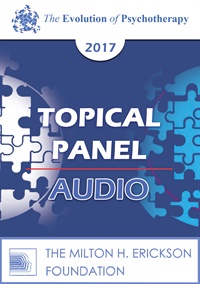
- Average Rating:
- Not yet rated
- Topic Areas:
- Topical Panels | Couples Therapy | Family Therapy | Marriage
- Categories:
- Evolution of Psychotherapy | Evolution of Psychotherapy 2017
- Faculty:
- John Gottman, PhD | Julie Gottman, PhD | Sue Johnson, EdD | Harriet Lerner, PhD
- Duration:
- 1:02:32
- Format:
- Audio Only
- Original Program Date:
- Dec 15, 2017
- Short Description:
- The family is a context in which treatment can be facilitated. Marriage has the capability of healing clients from old wounds.
- Price:
- $15.00 - Base Price
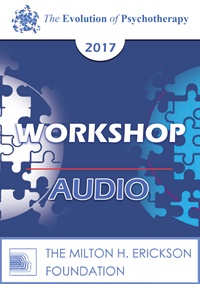
- Average Rating:
- Not yet rated
- Topic Areas:
- Workshops | Couples Therapy | IMAGO | Psychotherapy | Relationships | Conflict
- Categories:
- Evolution of Psychotherapy | Evolution of Psychotherapy 2017 | Pioneers in Couples and Family Therapy
- Faculty:
- Harville Hendrix, PhD | Helen LaKelly Hunt, PhD
- Duration:
- 2:44:25
- Format:
- Audio Only
- Original Program Date:
- Dec 13, 2017
- Short Description:
- This workshop introduces the global “Relationships First” initiative, focused on building relational competence through therapeutic tools in everyday life. Key practices include safe conversations, mirroring, and validating, along with techniques like the behavior change request and caring behaviors dialog. The session highlights how early life experiences shape adult relationships, the role of neuroscience in communication, and the importance of zero negativity in fostering lasting connection.
- Price:
- $15.00 - Base Price
Credit available - Click Here for more information
- Average Rating:
- Not yet rated
- Topic Areas:
- Workshops | Post-Traumatic Stress Disorder (PTSD) | Couples Therapy | Gottman Method | Psychotherapy | Trauma
- Categories:
- Evolution of Psychotherapy | Evolution of Psychotherapy 2017 | Online Continuing Education
- Faculty:
- John Gottman, PhD | Julie Gottman, PhD
- Course Levels:
- Master Degree or Higher in Health-Related Field
- Duration:
- 2:23:26
- Format:
- Audio and Video
- Original Program Date:
- Dec 13, 2017
- Short Description:
- Couples therapy is made much more complex when one or both partners suffers from PTSD. This workshop will demonstrate with films and lecture how to apply Gottman Method Couple Therapy to the treatment of PTSD. Films include cases of both childhood and military trauma.
- Price:
-
Sale is $29.00
price reduced from Base Price - $59.00
Credit available - Click Here for more information
- Average Rating:
- Not yet rated
- Topic Areas:
- Workshops | Couples Therapy | Family Therapy | Psychotherapy
- Bundle(s):
- Learning Track - Couples Starter Kit
- Categories:
- Evolution of Psychotherapy | Evolution of Psychotherapy 2017 | Online Continuing Education
- Faculty:
- John Gottman, PhD | Julie Gottman, PhD | Bill Bumberry, PhD
- Course Levels:
- Master Degree or Higher in Health-Related Field
- Duration:
- 2:36:31
- Format:
- Audio and Video
- Original Program Date:
- Dec 14, 2017
- Short Description:
- It’s been 50 years since the revolutionary inception of General Systems Theory that started couples and family therapy. Yet the central concepts were never made precise, or measurable and the theory never became scientific. In this workshop we show how we can now complete this theory and produce effective and powerful couples and family therapy methods.
- Price:
-
Sale is $29.00
price reduced from Base Price - $59.00
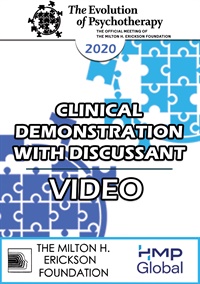
- Average Rating:
- Not yet rated
- Topic Areas:
- Couples Therapy | Clinical Demonstrations | Clinical Demonstrations with Discussant | Psychotherapy | Conflict | Relationships | IMAGO
- Categories:
- Evolution of Psychotherapy | Evolution of Psychotherapy 2020 | Pioneers in Couples and Family Therapy
- Faculty:
- Daniel Siegel, MD | Harville Hendrix, PhD | Helen LaKelly Hunt, PhD
- Course Levels:
- Master Degree or Higher in Health-Related Field
- Duration:
- 1 hour 32 minutes
- Format:
- Audio and Video
- Original Program Date:
- Dec 10, 2020
- Short Description:
- A demonstration of Imago Relationship Therapy, focusing on healing childhood wounds through structured communication. Techniques like mirroring, validation, and sentence stems promote empathy and connection. Discussion with Daniel Siegel includes the neurophysiological impact of presence and safe conversations, as well as the therapeutic potential of hugging in trauma recovery when offered in a secure, respectful environment.
- Price:
-
Sale is $29.00
price reduced from Base Price - $59.00
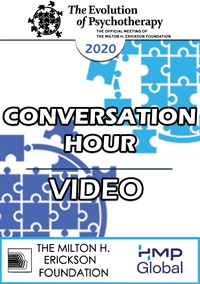
- Average Rating:
- Not yet rated
- Topic Areas:
- Couples Therapy | Conversation Hours
- Categories:
- Evolution of Psychotherapy | Evolution of Psychotherapy 2020
- Faculty:
- John Gottman, PhD | Julie Gottman, PhD
- Course Levels:
- Master Degree or Higher in Health-Related Field
- Duration:
- 1 hour 14 minutes
- Format:
- Audio and Video
- Original Program Date:
- Dec 12, 2020
- Short Description:
- The conversation hour will begin with a very brief presentation of the Gottman Sound Relationship House Theory, and then be entirely open to questions and answers.
- Price:
-
Sale is $29.00
price reduced from Base Price - $59.00
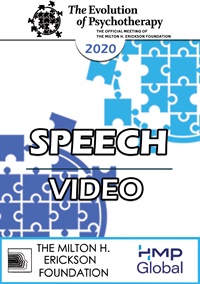
- Average Rating:
- Not yet rated
- Topic Areas:
- Couples Therapy | COVID | Speeches | Social Psychology | Workplace Psychology
- Categories:
- Evolution of Psychotherapy | Evolution of Psychotherapy 2020 | Pioneers in Couples and Family Therapy
- Faculty:
- Ellyn Bader, PhD
- Course Levels:
- Master Degree or Higher in Health-Related Field
- Duration:
- 1 hour
- Format:
- Audio and Video
- Original Program Date:
- Dec 12, 2020
- Short Description:
- Bader reveals strategies for couples navigating business partnerships including addressing communication, decision-making, and relationship dynamics. Drawing from her Silicon Valley experience, she offers insights into managing professional and personal challenges, with a focus on shared commitment, clear roles, and mutual appreciation. The presentation includes practical tools for couples working together, informed by research and real-world experiences.
- Price:
-
Sale is $29.00
price reduced from Base Price - $59.00
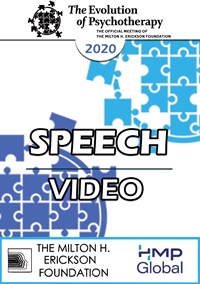
- Average Rating:
- Not yet rated
- Topic Areas:
- Couples Therapy | Speeches | IMAGO | Gender Dynamics | Feminism
- Categories:
- Evolution of Psychotherapy | Evolution of Psychotherapy 2020 | Pioneers in Couples and Family Therapy
- Faculty:
- Harville Hendrix, PhD | Helen LaKelly Hunt, PhD
- Course Levels:
- Master Degree or Higher in Health-Related Field
- Duration:
- 1 hour
- Format:
- Audio and Video
- Original Program Date:
- Dec 12, 2020
- Short Description:
- This presentation covers the fundamentals of creating conscious partnerships using Imago Relationship Therapy. Key practices include structured dialog, zero negativity, empathy, and daily affirmations. The approach helps couples replace conflict with curiosity, understand past experiences, and build emotional safety. The session also highlights how early life influences shape relationships and how consistent communication practices support lasting change through neuroplasticity.
- Price:
-
Sale is $29.00
price reduced from Base Price - $59.00
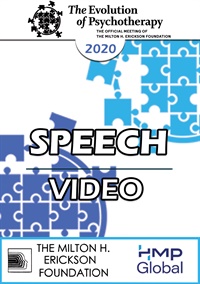
- Average Rating:
- Not yet rated
- Topic Areas:
- Couples Therapy | Sex and Sexuality | Speeches | Marriage | Communication | Empathy | Relationships
- Categories:
- Evolution of Psychotherapy | Evolution of Psychotherapy 2020 | Pioneers in Couples and Family Therapy
- Faculty:
- Michele Weiner-Davis, LCSW
- Course Levels:
- Master Degree or Higher in Health-Related Field
- Duration:
- 49 minutes
- Format:
- Audio and Video
- Original Program Date:
- Dec 13, 2020
- Short Description:
- This session introduces a practical model for helping couples navigate mismatched sexual desire—a common and often overlooked dynamic. With clarity and humor, the presentation reframes desire gaps as repairable, not terminal. Using tools like Real Giving and the Five Love Languages, therapists learn how to help couples reconnect emotionally and physically by addressing the issues they often avoid most.
- Price:
-
Sale is $29.00
price reduced from Base Price - $59.00
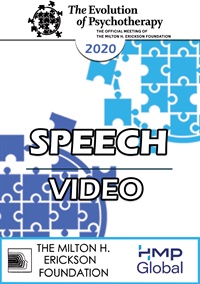
- Average Rating:
- Not yet rated
- Topic Areas:
- Couples Therapy | Speeches | Pain and Healing
- Bundle(s):
- EP20 Highlights
- Categories:
- Evolution of Psychotherapy | Evolution of Psychotherapy 2020
- Faculty:
- Harriet Lerner, PhD
- Course Levels:
- Master Degree or Higher in Health-Related Field
- Duration:
- 1 hour
- Format:
- Audio and Video
- Original Program Date:
- Dec 13, 2020
- Short Description:
- This speech will identify hidden sources of shame, with clinical and theoretical implications for helping our clients find self-regard, voice, and relational courage in the face of shame.
- Price:
-
Sale is $29.00
price reduced from Base Price - $59.00
Tags: EP20 Highlight
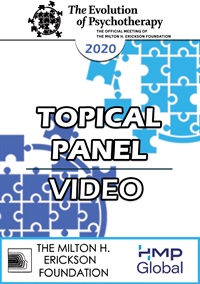
- Average Rating:
- Not yet rated
- Topic Areas:
- Training | Topical Panels | Goals of the Therapist | Attachment | Couples Therapy | Therapist Development
- Categories:
- Evolution of Psychotherapy | Evolution of Psychotherapy 2020 | Pioneers in Couples and Family Therapy
- Faculty:
- Harville Hendrix, PhD | Helen LaKelly Hunt, PhD | Jack Kornfield, PhD
- Course Levels:
- Master Degree or Higher in Health-Related Field
- Duration:
- 1 hour
- Format:
- Audio and Video
- Original Program Date:
- Dec 12, 2020
- Short Description:
- This panel focuses on the goal of therapy as fostering love, safety, and connection. Approaches include structured dialog, zero negativity, empathy, and daily affirmations to build safe relationships. Techniques such as deep listening and guided meditation support self-acceptance and emotional healing. The discussion highlights the universal need for safety and the adaptability of these methods across cultures and neurodiverse clients.
- Price:
-
Sale is $29.00
price reduced from Base Price - $59.00
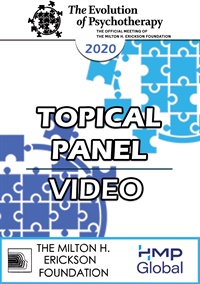
- Average Rating:
- Not yet rated
- Topic Areas:
- Couples Therapy | Topical Panels | COVID | Communication | Family Systems | Relationships | Therapeutic Process
- Categories:
- Evolution of Psychotherapy | Evolution of Psychotherapy 2020 | Pioneers in Couples and Family Therapy
- Faculty:
- Harriet Lerner, PhD | John Gottman, PhD | Julie Gottman, PhD | Michele Weiner-Davis, LCSW
- Course Levels:
- Master Degree or Higher in Health-Related Field
- Duration:
- 1 hour 4 minutes
- Format:
- Audio and Video
- Original Program Date:
- Dec 13, 2020
- Short Description:
- This session explores the relational fallout of the pandemic, including increased conflict and domestic violence. Presenters reflect on the difference between situational and characterological patterns, offering tools to reduce reactivity and foster safety. The conversation encourages therapists to lead with empathy, normalize stress, and help partners move from blame to understanding.
- Price:
-
Sale is $29.00
price reduced from Base Price - $59.00
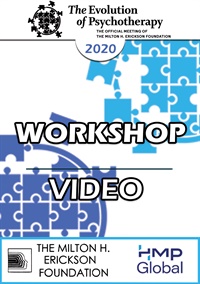
- Average Rating:
- Not yet rated
- Topic Areas:
- Couples Therapy | Infidelity | Workshops | Marriage | Psychotherapy | Relationships
- Categories:
- Evolution of Psychotherapy | Evolution of Psychotherapy 2020 | Pioneers in Couples and Family Therapy
- Faculty:
- Ellyn Bader, PhD
- Course Levels:
- Master Degree or Higher in Health-Related Field
- Duration:
- 2 hours
- Format:
- Audio and Video
- Original Program Date:
- Dec 09, 2020
- Short Description:
- A guide to therapeutic strategies for addressing infidelity, examining the emotional complexities and relationship dynamics that emerge after betrayal. Bader offers practical guidance for therapists working with couples, focusing on rebuilding trust, understanding individual psychological patterns, and supporting partners through healing and potential relationship transformation.
- Price:
-
Sale is $29.00
price reduced from Base Price - $59.00
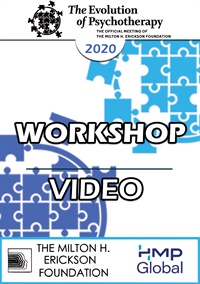
- Average Rating:
- Not yet rated
- Topic Areas:
- Couples Therapy | Workshops | Communication | Cultural and Social Contexts | Therapeutic Process
- Categories:
- Evolution of Psychotherapy | Evolution of Psychotherapy 2020 | Pioneers in Couples and Family Therapy
- Faculty:
- Harville Hendrix, PhD | Helen LaKelly Hunt, PhD
- Course Levels:
- Master Degree or Higher in Health-Related Field
- Duration:
- 1 hour 45 minutes
- Format:
- Audio and Video
- Original Program Date:
- Dec 09, 2020
- Short Description:
- This workshop is on Safe Conversations, a global initiative to build a relational culture through respectful, emotionally safe communication. Originating in Dallas, the project promotes zero negativity, daily affirmations, and structured dialogue practices like mirroring and validation. Emphasis is placed on relational competence, healing childhood wounds, and strengthening connections within couples and families as a path to broader social transformation.
- Price:
-
Sale is $29.00
price reduced from Base Price - $59.00
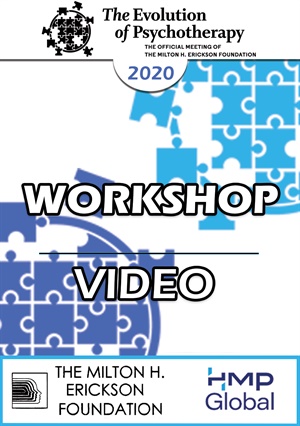
- Average Rating:
- Not yet rated
- Topic Areas:
- Couples Therapy | Workshops | Addiction
- Categories:
- Evolution of Psychotherapy | Evolution of Psychotherapy 2020
- Faculty:
- John Gottman, PhD | Julie Gottman, PhD | Robert Navarra, PsyD
- Course Levels:
- Master Degree or Higher in Health-Related Field
- Duration:
- 2 hours
- Format:
- Audio and Video
- Original Program Date:
- Dec 13, 2020
- Short Description:
- A relational approach to addiction treatment is the missing component in most contemporary addiction treatment models based on concerns that working with the couple system too soon increases the risk for relapse. It turns out there isn’t empirical support for this default assumption. Conversely, long-standing, and well-established research has consistently supported couple and family approaches in treating addictive disorders, defining relationship stability as the greatest predictor of long-term sobriety and recovery.
- Price:
-
Sale is $29.00
price reduced from Base Price - $59.00
- Average Rating:
- Not yet rated
- Topic Areas:
- Clinical Demonstrations | Couples Therapy | Developmental Therapy Model
- Categories:
- Evolution of Psychotherapy | Evolution of Psychotherapy 2021 | Pioneers in Couples and Family Therapy
- Faculty:
- Ellyn Bader, PhD
- Course Levels:
- Master Degree or Higher in Health-Related Field
- Duration:
- 1 hour
- Format:
- Audio and Video
- Original Program Date:
- Dec 01, 2021
- Short Description:
- A powerful couples therapy technique that transforms communication by teaching partners to take turns sharing and listening. One partner expresses concerns without blame, while the other asks empathetic questions, fostering deeper understanding and personal growth. Dr. Ellen Bader demonstrates how this method helps couples build self-awareness, manage tension, and create more meaningful connections.
- Price:
- $59.00 - Base Price
- Average Rating:
- Not yet rated
- Topic Areas:
- Clinical Demonstrations | IMAGO | Communication | Couples Therapy | Experiential Therapy
- Categories:
- Evolution of Psychotherapy | Evolution of Psychotherapy 2021 | Pioneers in Couples and Family Therapy
- Faculty:
- Harville Hendrix, PhD | Helen LaKelly Hunt, PhD
- Course Levels:
- Master Degree or Higher in Health-Related Field
- Duration:
- 1 hour
- Format:
- Audio and Video
- Original Program Date:
- Dec 01, 2021
- Short Description:
- This demonstration outlines the Imago dialog process, emphasizing structured communication through mirroring, validation, and empathy. Using sentence stems to engage higher-level thinking, the approach shifts focus from individualism to relational connection. A live demonstration shows how the method helps partners understand each other’s needs, reduce conflict, and build a more empathetic, connected relationship.
- Price:
- $59.00 - Base Price
- Average Rating:
- Not yet rated
- Topic Areas:
- Conversation Hours | Brief Therapy | Couples Therapy | Divorce | Relationships | Therapist Development
- Categories:
- Evolution of Psychotherapy | Evolution of Psychotherapy 2021 | Pioneers in Couples and Family Therapy
- Faculty:
- Michele Weiner-Davis, LCSW
- Course Levels:
- Master Degree or Higher in Health-Related Field
- Duration:
- 1 hour
- Format:
- Audio and Video
- Original Program Date:
- Dec 05, 2021
- Short Description:
- Michele Weiner-Davis shares what she’s learning from her latest work with couples facing infidelity and disconnection. She outlines a three-stage model for healing affairs, explores why desire discrepancies can quietly erode connection, and reflects on the shift toward longer, more immersive sessions. Grounded, hopeful, and highly practical, the session invites fresh thinking for therapists supporting couples on the brink.
- Price:
- $59.00 - Base Price


